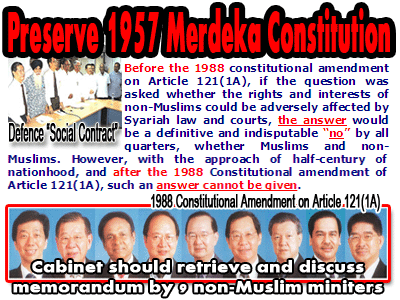
The Cabinet tomorrow should give serious attention to the week-long special prayers by non-Muslim religions, retrieve the memorandum by nine of ten non-Muslim Ministers in January last year and place on top of its agenda the rising anxieties and fears of non-Muslim Malaysians about their religious rights and sensitivities.
It is a cry of despair and desperation when the Malaysian Consultative Council of Buddhism, Christianity, Hinduism, Sikhism and Taoism (MCCBCHST) has to resort to the special prayers campaign to press their plight over their anxieties and fears over growing encroachments of religious freedoms and rights in plural Malaysia, although freedom of religion is entrenched in Article 11 of the Federal Constitution.
It is also a signal that more and more Malaysians are losing hope and confidence in the ability of the courts to play its role as the bulwark of the constitutional freedoms and liberties of Malaysians entrenched in the Constitution.
This is why the MCCBCHST, almost giving up hope in human intervention in the name of justice, fair play and the constitutional guarantees of freedom of religion, is forced to the last resort, in the words of the MCCBCHST president Chee Peck Kiat, of seeking “divine help to to impress upon the leaders of the government and judiciary to uphold the Federal Constitution”.
Chee said: “The only resolution I can think of to the issue is (engaging in) prayers so that the leadership and the judges will be more enlightened (and be moved by their) moral conscience to interpret the Constitution in accordance to what is in it rather than interpreting it according to (their religious beliefs).”
All the Cabinet Ministers should feel thoroughly ashamed of themselves that they have driven the MCCBCHST to seek “divine help” instead of “human intervention” in order to resolve the worsening constitutional crisis over freedom of religion, because of their indifference, neglect or sheer cowardice from addressing and resolving the issues involved.
The latest is the furore over the Court of Appeal’s dismissal of a bid by a Hindu woman, R Subashini, to stop her recently-converted husband Muhammad Shafi from bringing divorce proceedings to the Syariah Court. The Court of Appeal also held that Shafi could apply to the Islamic court to convert his under-aged children without permission from the non-Muslim spouse.
During the height of the M. Moorthy controversy in January last year, nine of the ten non-Muslim ministers submitted a memorandum to the Prime Minister asking for a just resolution to the controversy in accord with the Merdeka social contract reached by the forefathers of the major communities during the founding of the nation.
There is no conflict and tension between Muslims and non-Muslims or Malays and non-Malays, as the issue at stake is about the question of justice — the restoration of the pre-1988 position of the constitutional rights of the non-Muslim Malaysians and the supremacy of the Constitution as the supreme law in the country.
Before the 1988 constitutional amendment on Article 121(1A), if the question was asked whether the rights and interests of non-Muslims could be adversely affected by Syariah law and courts, the answer would be a definitive and indisputable “no” by all quarters, whether Muslims and non-Muslims. However, with the approach of half-century of nationhood, and after the 1988 Constitutional amendment of Article 121(1A), such an answer cannot be given.
This is the nub of the issue – to restore to non-Muslim Malaysians their constitutional right not to be adversely affected by Syariah law and courts by maintaining their right to remedy in the civil courts – a cardinal principle of the “social contract” on which this nation was founded in 1957.
If the Cabinet Ministers continue to shut out the rising concerns of non-Muslims about their constitutional rights and sensitivities, including the ongoing week-long special prayers campaign, they are doing a grave disservice to the country particularly on the occasion of the 50th anniversary of national independence.